Functional digestive symptoms and quality of life in patients with Ehlers-Danlos syndromes: results of a national cohort study on 134 patients.Abstract
BACKGROUND AND OBJECTIVES: Ehlers-Danlos syndromes (EDS) are a heterogeneous group of heritable connective tissue disorders. Gastrointestinal manifestations in EDS have been described but their frequency, nature and impact are poorly known. We aimed to assess digestive features in a national cohort of EDS patients.
METHODS: A questionnaire has been sent to 212 EDS patients through the French patient support group, all of which had been formally diagnosed according to the Villefranche criteria. The questionnaire included questions about digestive functional symptoms, the GIQLI (Gastrointestinal Quality of Life Index), KESS scoring system and the Rome III criteria.
RESULTS: Overall, 135 patients (64% response rate) completed the questionnaire and 134 were analyzable (123 women; 91%). Mean age and Body Mass Index were respectively 35± 14.7 years and 24.3± 6.1 kg/m(2). The most common EDS subtype was hypermobility form (n=108; 80.6%). GIQLI and KESS median values were respectively 63.5 (27-117) and 19 [13.5-22]. Eighty four percent of patients had functional bowel disorders (FBD) according to the Rome III criteria. An irritable bowel syndrome according to the same criteria was observed in 64 patients (48%) and 48 patients (36%) reported functional constipation. A gastro-esophageal reflux disease (GERD) was reported in 90 patients (68.7%), significantly associated with a poorer GIQLI (60.5±16.8 versus 75.9±20.3; p<0.0001). GIQLI was also negatively impacted by the presence of an irritable bowel syndrome or functional constipation (p=0.007). There was a significant correlation between FBD and GERD.
CONCLUSIONS: Natural frequency of gastrointestinal manifestations in EDS seems higher than previously assessed. FBD and GERD are very common in our study population, the largest ever published until now. Their impact is herein shown to be important. A systematic clinical assessment of digestive features should be recommended in EDS.Full article here.
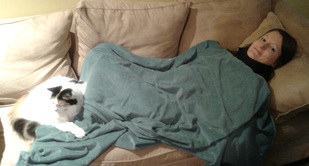 That's me on the couch, patiently waiting for painkillers to kick in to I can feel a bit human and maybe accomplish something. I'm wearing a soft neck brace because my main problem today (and many days) is significant cranial cervical instability (CCI) and an abnormal clivo-axial angle, which causes, basically, a terrible neck migraine. The brace manages to hold things in place temporarily. It sounds a little crazy, but I cannot wait for my appointment with Dr. H. Unfortunately, his wait list is so long that I completed the paperwork in September, and my appointment is in April. But I'm hopeful that like so many other EDSers, I will get fixed.
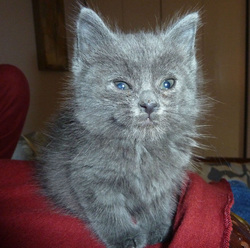 So I've been pretty quiet lately. The reason for this is because of the little kitten pictured here. I am a kitten foster mom, volunteering with City Kitties, a local rescue group. Because I am around a lot due to my EDS, I have learned to bottle feed kittens and to administer medicine. I have therefore become the go-to for tiny and sick kittens. Mara is our latest foster, and she is a sweetheart. She is finally finished with her azithromycin (fish flavored, of course), and she is beginning to feel better and run around like a kitten should. She still has to be kept separate from our resident cats, so she gets to stay in the "kitten room," otherwise known as the the master bedroom in our tiny house (Kitten: 1 Humans: 0). Eventually, she will get to move downstairs with the rest of the brood, but for now, I'm enjoying my time with my tiny foster kitty. She reminds me that even though I'm sick, I can still take care of others, and succeed at it.
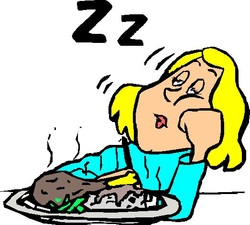 Hello and happy belated Thanksgiving! I have not been online all that much recently, as I've been alternatively spending time with family and attempting to recover and heal myself for the next visit. I'm still learning how to pace myself properly during the holidays, so it has been a lot of early nights and later mornings for me. Which is OK--I feel like the holiday season, especially this year with Thanksgiving and Hanukkah overlapping, and and Christmas so close--is a marathon. Your family will want you there for the finish, so remember to take care of yourself!
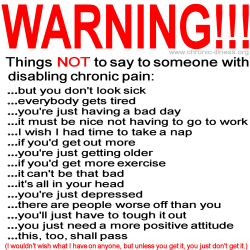 Validation. It's a word that I've used more and more since being unofficially, then officially, diagnosed with Ehlers-Danlos Sydrome, Fibromyalgia, and POTS (and a plethora of secondary illnesses that go hand-in-hand with both). It seems that even with that piece of paper from a doctor's office with a diagnosis in black and white, getting the type of validation needed from family, friends, other doctors, etc., becomes a Herculean task.
And why should I (and you) care about being validated? Those of us with chronic illnesses need the understanding of others (the so-called "Normals") around us to be properly physically and emotionally cared for and treated. EDSers especially--and others with rarer types of disorders--need the validation that their disorder is real, that their pain is real, and that others believe their disabilities. Otherwise, we are left with "it's all in your head" syndrome.
Thus, validation is important because, without it, no one can truly address our physical and emotional needs. We absolutely need the understanding of physicians in order to get to the root of physical symptoms and to flesh out treatment plans. However, we also need the validation of friends, family, and community to help and support us emotionally. The validation of those close to us helps to get past the frustration of when other Normals find it comforting(?) and/or helpful(?) to say things like, "no pain, no gain!" or "if you'd just get out of the house more you'd feel much better" or "have you tried [fill in the blank] vitamin?". Even when we are coping with illness well, and have come to terms with EDS and the emotions involved, one comment or look can send us reeling back to when we were first sick and dealing all the initial skepticism.
Finding validation from all sources is a difficult and never-ending road. It is, of course, crucial that EDSers find the validation they need from the important sources--mainly the physicians who are in charge of your treatment plan. Having validation from close family and good friends is important; however, you must remind yourself that not everyone is willing to listen and believe. You may never find validation from certain individuals. And that is OK. Remember that the way they respond to you is indicative of something wrong with them--not something wrong with you. And remember that the entire EDS community believes and supports you!
I recently came across this site. It contains some good information that is difficult to find elsewhere (at least in one place) and links. Medical Zebras.
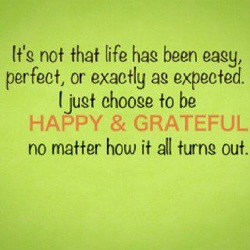 This is the time of year when we all gather around and say (or at least think about) for whom and what we give thanks. This year, for my combined family (my immediate family and my husband's), the Thanksgiving holiday will be a difficult one. Since May, we have lost my husband's great-aunt, my Gram, and his Grandma. We've experienced a number of setbacks with my illness, as well new diagnoses for my father and sister. In all, it has been a really rough year for me--probably the most trying one of my life so far. However, I am incredibly grateful and thankful for my wonderful husband (who I will call "K" on here), who has stood by me through everything. K and I have known each other for year; so long in fact, he actually remembers me before EDS started to have a negative effect on my life. I cannot imagine how difficult it is for him to have to constantly adjust to the new facets of EDS. But he does so, and we have gotten through some pretty terrible times in order to have some fantastic ones together. So this year, I am thankful for K, my match in life. We both realize that, even though our life together has not turned out anywhere close to what we expected, the fact that were together, and working on our love together, is what matters. EDS or not, this is what counts.
|


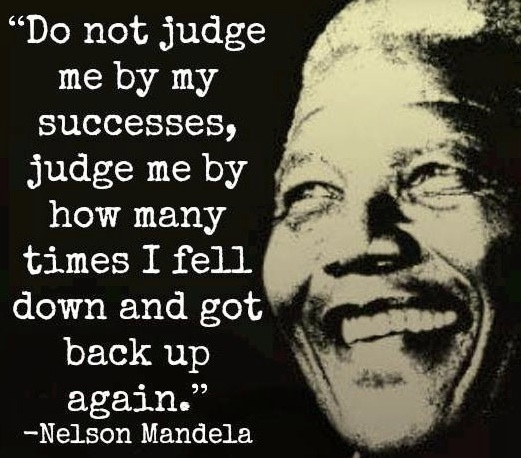
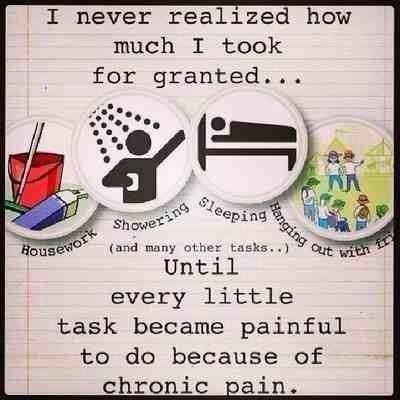


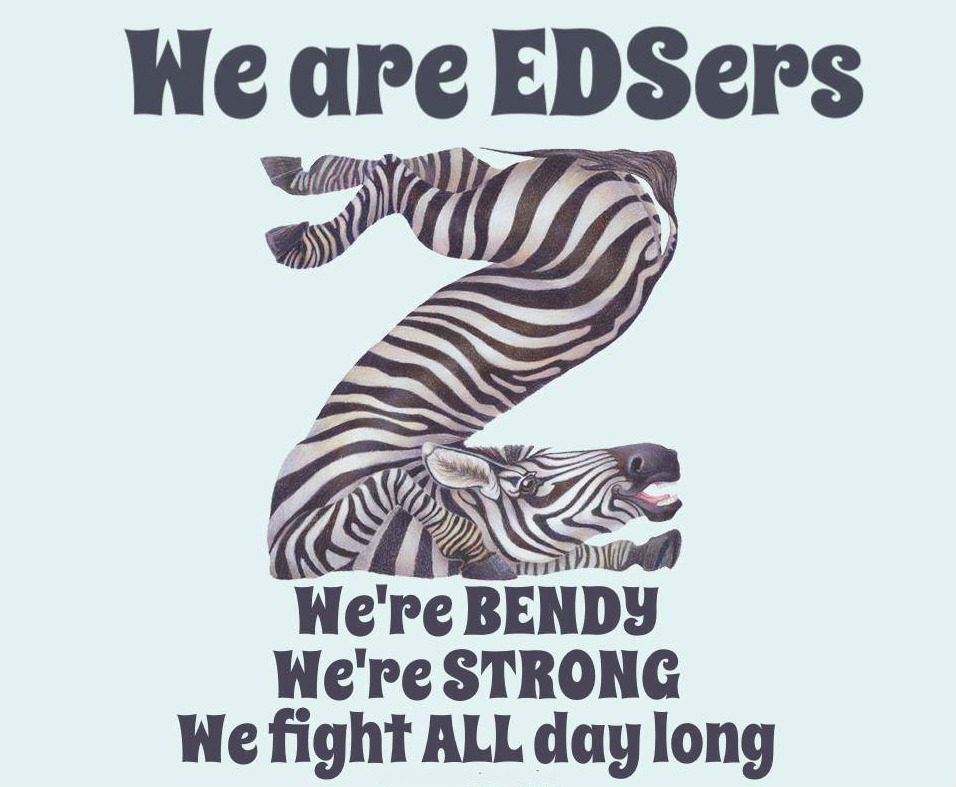

 RSS Feed
RSS Feed